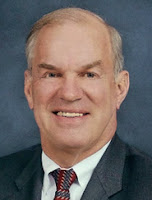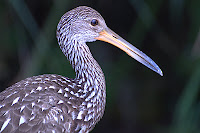Ever heard of the phrase “Ordinary High Water Line?”
 |
| Senator Alan Hayes R - Umatilla |
If not, you need to find out about it because it’s very important to you and it’s about to change. If state representative Tom Goodson (R – Rockledge) and senator Alan Hayes (R - Umatilla ) have their way, your rights of access and opportunity to enjoy Florida’s vast lakes, rivers and wetlands will be dramatically changed, and not in a good way. Goodson has sponsored House Bill 1103 and the companion Senate Bill 1362 with the same language is being sponsored by Hayes.
 |
| Rep. Tom Goodson R - Rockledge |
The “ordinary high water line” is a line defined by law that declares the extent to which private property owners can claim ownership to certain lands adjacent to a water body vs. that which is held in trust for and by the public. The concept of this line goes back over a century to when the federal government first gave land to the newly-established State of Florida to drain, clear, populate and eventually develop an economic base for its inhabitants. Open navigation of the state’s waterways, at the time, was largely the only way to move people and goods and thus critical to the state’s ability to grow economically.
The definition of the line has been the focus of major legal battles because, depending on how it is worded, large land owners, corporate and otherwise, would have much to gain or lose by where the courts set the line, and, conversely, of course, the public would also have much to lose or gain.
As a result of these legal fights, the definition of the “line” and how the physical demarcation it represents is subsequently identified on the ground has been refined over the years by court precedent and clarifying laws. Today, the definition and, thus, where the line can be legally determined to exist physically, is as clear as it has ever been.
The Ordinary High Water Boundary
The boundary between publicly owned navigable waters and adjacent privately owned uplands is the ordinary high water boundary. Two seventy-two year-old Florida Supreme Court decisions definitively addressed how the ordinary high water boundary is located in Florida. The first case states that the ordinary high water boundary represents just what the words suggest: the ordinary reach of high water during the year. Thus, the boundary is, in general, the normal or average reach of water during the high water season.(16) The term "ordinary" excludes floods and other unusual high water events but includes the average high water of each year.(17) In determining the location of the boundary, Florida Supreme Court cases recognize the state's unique topography and differentiate between steep-banked and flat-banked water bodies. On steep-banked water bodies, the boundary is located where the presence and action of water has wrested the bank of vegetation and left a visible mark. However, on low, flat-banked water bodies - most lakes and streams south of Orlando - there is no well-defined mark, and the boundary is located where the presence of the water prevents the cultivation of ordinary agricultural crops. In 1927, the Florida Supreme Court also ruled that where the shore of a water body is low, flat, and vegetated, ordinary high water can be determined by locating water marks on local objects such as dock pilings and trees.
Now comes Senator Alan Hayes from Umatilla and Representative Tom Goodson from Rockledge, both of whom have parts of their district covering Lake County, who are proposing to change this definition. The impact upon the rights of the public to continue to enjoy Florida’s lakes and waterways will be dramatic and historic.
The Florida Conservation Coalition has this to say about it:
“The effect of this legislation would be a lowering of the elevation of the Ordinary high Water Line, thus moving the ownership boundary of private lands further towards or into the water and shrinkage of acreage currently in public ownership. This would result in huge transfers of publicly owned land along the State's rivers, lakes and streams into private ownership and amount to the loss of thousands of acres of land that now belong to all the people of Florida.
These bills are not in the best interest of ordinary Floridians or visitors to our State. If you are a sport fisherman, hunter, birdwatcher, kayaker or airboat enthusiast, it would mean that someday soon when headed to your favorite place you may encounter a barbed wire fence and "No Trespassing" sign blocking your way. Your ability to travel on our rivers and lakes in Florida may be limited to the main channel of the river or the most open water part of the lake. In the future you may see roof tops, strip malls and parking lots where deer, ducks and wading birds used to live.”
These bills are not in the best interest of ordinary Floridians or visitors to our State. If you are a sport fisherman, hunter, birdwatcher, kayaker or airboat enthusiast, it would mean that someday soon when headed to your favorite place you may encounter a barbed wire fence and "No Trespassing" sign blocking your way. Your ability to travel on our rivers and lakes in Florida may be limited to the main channel of the river or the most open water part of the lake. In the future you may see roof tops, strip malls and parking lots where deer, ducks and wading birds used to live.”
“This is privatization of Florida's public lands, rivers and lakes, pure and simple. If these bills win passage, you lose part of Florida.”
Think about this:
 |
| Aramus guarauna (Limpkin) Lake Tsala Apopka (Vergara) |
Florida has spent billions of dollars acquiring millions of acres of floodplains and wetlands that even under the current definition were in jeopardy These lands serve as irreplaceable “kidneys” which cleanse and sanitize our natural water bodies through nutrient uptake and natural filtration. We can thank the wisdom of former leaders as Republican Governors Bob Martinez, Jeb Bush and Charlie Crist and Democrat Governors as Bob Graham and Lawton Chiles who supported funding for these programs and made them viable, programs that were approved by more than one referendum of Florida voters.
Think about why these lands, which are so critical to Florida being the great natural state it is, had to be placed in public ownership in the first place where their titles would be officially recorded in courthouses and the public’s rights would be thus detailed, specific and preserved. Why spend the money?
Because this is how easy it is for a couple of legislators, clearly either ignorant of or intentionally ignoring the ramifications of their stupidity, can propose a law that would allow lands not in public ownership but being held in public trust by the state’s constitution and body of related laws to be so lightly and egregiously given away to special interests. It is a stunning example of how, without title, the public’s interest in public lands can be forfeited to private interests by simply changing the definition of “ordinary high water line.” It is more than a compelling example of how shortsighted the current governor’s efforts are to stop acquisition of environmentally valuable land and the cessation of funding for the voter-approved and popular land acquisition program, Florida Forever.
And think about this. If this bill is passed, and all the thousands of acres in question become legally owned by private individuals, it will be forever. If a future legislature should change its mind and change the separation between public and private lands back to where it is now, the state will have to ante up hundreds of millions of dollars if not billions because government cannot take private lands without just compensation. Wouldn’t that be a brilliant move by large land owners and a cosmically stupid one by the legislature who’s supposed to be working for us, the people?
It is my understanding that Sam Ard, lobbyist for the Cattlemen’s Association (and many others), is leading the charge to get the bill passed (If I'm wrong, Sam, let me know.). Which, experience tells me, the Florida Chamber, the Florida Land Council and others involving large landowners may also rally behind it because it’s the largest landowners who will benefit the most from this bill becoming law. These groups wield huge influence in Tallahassee. It will also be more than casually interesting to see what position J. D. Alexander takes. He and his family are certainly large landowners by any definition and, as such, could be huge beneficiaries of the bill becoming law. He's presently chairman of the senate budget committee and one of the legislature's most powerful senators.
In concert with the Florida Conservation Coalition, you are urged to phone and/or email your district legislators as well as Rep. Goodson and Sen. Hayes and let them know how much you oppose these bills.
Tele - (850) 487-5014
Tallahassee Office:
324 Senate Office Building
404 South Monroe Street
Tallahassee, FL 32399-1100
Goodson: Email tom.goodson@myfloridahouse.gov
Telephone 850-488-3006
Tallahassee Office;
1101 The Capitol
402 South Monroe
Tallahassee, Fl 32399-1300
I emailed my letters this morning. My 2012 resolution is to stop complaining and start informing the appropriate people that they need to listen to their constituents - after all, they are elected to do the best for Florida, not line their own pockets.
ReplyDeleteThat's great! Thank you!
ReplyDeleteToday is MLK Day - and MLK said: "Our lives begin to end the day we become silent about things that matter." So get busy and drop jackels Goodson and Hays a line and tell them just what you think of their land giveaway bills - tomorrow may be too late.
ReplyDeleteWe are circulating the word throughout the paddling and environmental communities.
ReplyDeleteBetween this and the surplus lands directives, the current administration is bound and determined to give away some of the best of what's left of Florida. Keep an eye on DEP, Citrus County, and Port Citrus. There is no way to build Port Citrus without obliterating the west end of the Marjorie Harris Carr Cross Florida Greenway. Who will benefit? Follow the money.
Thanks for posting this! So far I have Action alerts from Audubon, 1000 Friends of Florida, United Waterfowlers of FL and concerned emails from airboaters, paddlers, tourism folks, and others. If anyone takes the lead and does a sign-on letter please let us know.
ReplyDeleteWater access is so important to our tourism industry in Florida, whether for boaters, birders, hunters or hikers. I cannot believe we are even considering this Bill.
Mary Rawl
President
Save Our Creeks
I'm an independent traveling naturalist and guide now living in Oregon but still paying taxes in Florida. I will come in person to oppose this, if necessary!
ReplyDeleteThank you, Ellen. Am forwarding your note to the Florida Conservation Coalition who may be back in contact with you. The coalition is a non-profit, non-partisan coalition of organizations and folks like yourself that you may want to consider joining (no cost). Meanwhile, please see its website at: http://floridaconservationcoalition.org/.
ReplyDeleteYour interest is sincerely appreciated. Natural Florida is under siege.
Sandspur